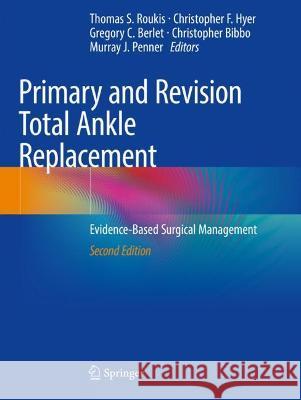Primary and Revision Total Ankle Replacement: Evidence-Based Surgical Management » książka
topmenu
Primary and Revision Total Ankle Replacement: Evidence-Based Surgical Management
ISBN-13: 9783030692711 / Angielski / Miękka / 2022
Primary and Revision Total Ankle Replacement: Evidence-Based Surgical Management
ISBN-13: 9783030692711 / Angielski / Miękka / 2022
cena 623,94
(netto: 594,23 VAT: 5%)
Najniższa cena z 30 dni: 597,58
(netto: 594,23 VAT: 5%)
Najniższa cena z 30 dni: 597,58
Termin realizacji zamówienia:
ok. 22 dni roboczych.
ok. 22 dni roboczych.
Darmowa dostawa!
Now in a fully revised and updated second edition, this definitive text provides comprehensive coverage of all aspects of total ankle replacement (TAR), written by authors who are recognized experts in the field. Though the main focus is on total ankle replacement prostheses available for use in North America, the lessons learned and presented here are applicable to the growing volume of cases worldwide.
Divided into five thematic sections, each chapter is a purposeful mix of theory, data, and tips/pearls with detailed illustrations, tables, and references. Appropriately evidence-based, they include bullet points for quick reference and rely heavily on step-by-step intraoperative photographs and radiology. Part I presents the history of TAR, implant considerations (mobile-bearing vs. fixed-bearing), and indications/contraindications for the procedure. The subsequent three sections discuss all aspects of primary TAR, procedures secondary to primary TAR, and revision TAR, respectively, bringing together the most recent evidence, implant options and surgical techniques. The final section covers topics related to limb salvage after failed TAR, including preventive measures, wound healing, and infection management.
Generously illustrated and well-referenced, Primary and Revision Total Ankle Replacement remains the gold standard text on this topic for orthopedic surgeons, podiatrists and foot and ankle clinicians at all levels.











